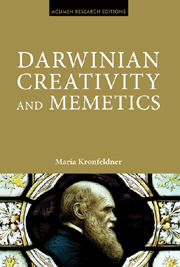7 - Conclusion
Summary
DARWINIAN CREATIVITY AND MEMETICS DEMYSTIFIED
Darwin's theory has proved to be a very successful theory in explaining biological evolution. Analogical reasoning from this area to other scientific domains has also proved to have its heuristic merits (e.g. in immunology or computer programming), leading to powerful theories and applications in these domains. However, the same does not hold for the Darwinian approach to creativity and memetics. The three basic analogies, on which these two accounts are based, are deficient in descriptive as well as explanatory terms. They are either wrong or trivial.
All things considered, they do not provide a fourth Freudian insult for mankind, a second Darwinian revolution that could demystify not only God's but also our creative power as illusory. On the contrary, what can and should be demystified are these analogies. Although we do not have a God-like creativity, we are nonetheless the authors of culture: creating, transmitting and selecting ideational units that are not replicators in a narrow sense and have no existence and causal force that is independent from their authors.
In particular, in Chapter 4, I illustrated that creativity is not based on undirected variation, even though culture itself can be regarded as a gradually changing variational system based on selection by groups of individuals. First, novelty in culture is already pre-selected by the creative individual when it enters the cultural pool.
- Type
- Chapter
- Information
- Darwinian Creativity and Memetics , pp. 135 - 140Publisher: Acumen PublishingPrint publication year: 2011



